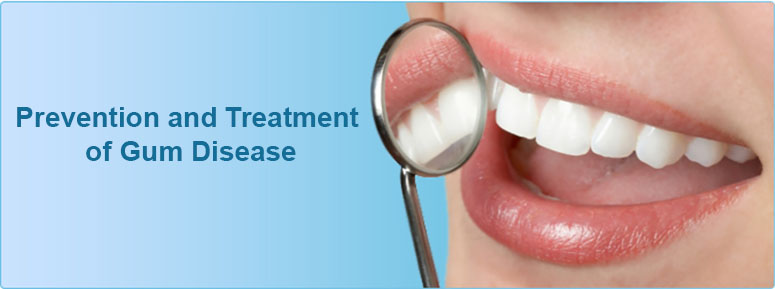Despite all the recent advances in dental care, gum disease is still significantly prevalent in the American population. Unfortunately, it is also one of the leading causes of tooth loss. North Palm Beach dentist, Dr. Adrian Guerra, offers several treatment options to repair the damage caused by gum disease. In an effort to help you understand gum disease, Dr. Guerra also offers some tips to help you prevent gum disease.

Gum disease affects most people at some time during their life. It is usually caused by a build-up of plaque on teeth. Gum disease is also called periodontal disease and is basically an infection of the gums. There are two stages of gum disease. The first stage is less severe and is referred to as gingivitis. With gingivitis, the infection is localized to the gum tissue surrounding the teeth. If left untreated, gingivitis will develop into the next, more serious stage, periodontitis.
Periodontitis is much more severe because the infection spreads to the tissue below the gum line and even into the jawbone. As periodontitis sets in, pockets begin to form between the teeth and the gums. These pockets lead to the gums pulling away from the teeth, allowing more plaque and bacteria into these pockets which adds to further spreading of the infection. As the gums pull away, teeth will eventually become loose and ultimately fall out.
The signs of gum disease are different at each stage. Early gum disease can be difficult to detect due to mild symptoms.
The main cause of gum disease, as we have stated, is plaque and tartar buildup. Why is this the case you might be wondering? The answer is that both plaque and tartar are made up of food particles, saliva, bacteria, and acid from bacterial digestion. The bacteria formed is hostile and releases toxins that can damage and inflame the gums. Gum disease is also caused by such conditions as:
It begins with you, the patient. Practicing proper oral care is the best way to reduce your risk of gum disease. Brush at least twice a day, floss once a day, and visit your dentist for regular cleanings. Professional cleanings are vital to ridding your mouth of tartar buildup, especially along the gum line and in hard to reach areas of the mouth. Below is a list of treatment options beginning with the treatment for mild disease to the treatment for more severe disease.
Antibiotics: Antibiotics are given to kill the bacteria that are responsible for the gum infection. Antibiotics may be all that is required to stop the infection but is also often given in conjunction with other treatments.
Root planing and scaling: Root planing and scaling is a process in which the tooth is cleaned and smoothed below the gum line down to portions of the root.
Gingivectomy: A gingivectomy is necessary when gum tissue is severely diseased. A gingivectomy is performed by removing any diseased gum tissue, followed by reshaping the gum tissue to close pockets created by the gum disease.
Flap procedure: A flap procedure is necessary with very severe gum disease that has damaged the bone. With the flap procedure, a portion of the gum is cut to create a “flap.” The flap is pulled away from the tooth to allow access for the dentist to clean the tooth root and repair the damaged bone. Once cleaned and repaired, the gum is put back and stitched in place.
Gum disease is a very serious condition. To assist you if you have suffered tooth loss, we offer a number of restorative procedures to repair damage and give you a beautiful smile. For our patients in North Palm Beach, Juno Beach, Palm Beach Gardens, Jupiter, Tequesta and surrounding areas, dental implants are a great solution to replacing teeth lost through gum disease. Contact our office today! We will be happy to help you restore the health of your teeth and gums.
Dr. Guerra can fully assess the many variables unique to your needs. If this is your first visit, you’ll discover that our skilled and friendly members work to make you comfortable. Your amazing smile begins with an exam and consultation at AMG Dental Group; give us a call at 561-844-6146.
If you’ve had issues with periodontal (gum) disease, a few things have undoubtedly changed for you. You may be seeing us for dental cleanings and checkups more often and you now know how important it is to be extra diligent about your daily brushing and flossing.
There’s one other thing we want to emphasize: Changing your diet. Some of the foods you may be eating actually work against you in your battle against gum disease. However, increasing your intake of other certain foods could boost your overall oral health.
The worst culprits in the first category are carbohydrates, which make up almost half the average diet in the Western world believe it or not, mainly as added sugar. Too many of the wrong types of carbs can increase inflammation—which also happens to be a primary cause of tissue damage related to gum disease.
Carbohydrates like sugar or processed items like bakery goods, white rice or mashed potatoes are quickly converted to glucose (the actual sugar used by the body for energy) in the bloodstream and increase insulin levels. That can then lead to chronic inflammation. Complex or unprocessed carbohydrates like vegetables, nuts or whole grains take longer to digest. These carbs convert to glucose slowly which can help reduce inflammation.
You should also add foods rich in vitamins C and D (cheese and other dairy products, for instance) and antioxidants to further protect your oral health.

